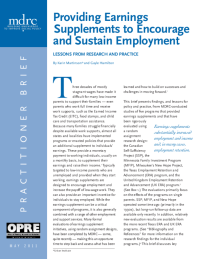Providing Earnings Supplements to Encourage and Sustain Employment
Lessons from Research and Practice
Three decades of mostly stagnant wages have made it difficult for many low-income parents to support their families — even parents who work full time and receive work supports, such as the Earned Income Tax Credit (EITC), food stamps, and child care and transportation assistance. Because many families struggle financially despite available work supports, almost all states and localities have implemented programs or enacted policies that provide an additional supplement to individuals’ earnings. These provide a monetary payment to working individuals, usually on a monthly basis, to supplement their earnings and raise their income. Typically targeted to low-income parents who are unemployed and provided when they start working, earnings supplements are designed to encourage employment and increase the payoff of low-wage work. They can also provide an important incentive for individuals to stay employed. While the earnings supplement can be a critical component of programs, it is also generally combined with a range of other employment and support services. Many formal evaluations of earnings supplement initiatives, using random assignment designs, have been completed by MDRC — some, quite recently — making this an opportune time to step back and assess how to build on successes and challenges in moving forward.
This brief presents findings, and lessons for policy and practice, from MDRC-conducted studies of five programs that provided earnings supplements and that have been rigorously evaluated using a random assignment research design: the Canadian Self-Sufficiency Project (SSP), the Minnesota Family Investment Program (MFIP), Milwaukee’s New Hope Project, the Texas Employment Retention and Advancement (ERA) program, and the United Kingdom Employment Retention and Advancement (UK ERA) program. The evaluations primarily focus on the effects of the programs on single parents. SSP, MFIP, and New Hope operated some time ago (primarily in the 1990s), but long-run follow-up data are available only recently. In addition, relatively new evaluation results are available from the more recent Texas ERA and UK ERA programs.
This brief discusses key findings from evaluations of these earnings supplement programs and then provides lessons for both policy and practice that have emerged from these initiatives. While each program had its own set of unique circumstances and lessons (and none is currently operating), the focus here is on common themes across the initiatives.






